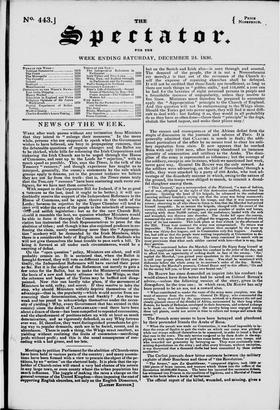NEWS OF THE WEEK.
WEEK after week passes without any intimation from Ministers that they intend to " enlarge their measures." In the mean while, persons who are supposed to speak what the Government wishes to have believed, are busy in propagating rumours, that the debateable questions of organic changes and the Ballot are to be shirked, while bills for reforming the Irish Corporations and tinkering the Irish Church are to be urged through the House of Commons, and sent up to the Lords for " rejection," with as much speed as possible. This, says the Times, is the talk of the Treasury " runners;" and though experience has taught us to interpret, generally, the enemy's statements by the rule which gossips apply to dreams, yet in the present instance we believe they are not far from the truth : that is, the Times states truly that the Trea4ury "runners" have been scattering such voces am- biguas, for we have met them ourselves. With, respect to the Corporation Bill for Ireland, if it be as good a measure as the last, (and it ought to be better,) it will un- doubtedly receive the support of the Independent Reformers in the House of Commons, and be again thrown in the teeth of the Lords; because its rejection by the Upper Chamber will tend to Opeii still wider the eyes of the people to the mischiefs of irrespon- ttt* and selfish legislation : but as for the new Church Bill, should it resemble the last, we question whether Ministers would be able to force it through the Commons. The National Asso- ciation has instructed the Irish Representatives to press for the abolition of tithes ; and though it has also enjoined prudence in en- forcing the claim, surely something more than the "Appropria- tion " mockery will be demanded by the Irish Members, while there is a considerable body of English and Scotch Radicals who will not give themselves the least trouble to pass such a bill. To bring it forward at all under such circumstances, would be a courting of defeat.
On the "open question" policy, Ministers are silent, and will probably remain so. It is surmised that, when the Ballot is brought forward, they will vote on different sides: and thus, prac- tically, the Independent Reformers will have carried their point so far. But it is the object of the Reformers not merely to gain a few votes for the Ballot, but to make the Ministerial concession the basis of a new and hearty alliance with the Whigs, so that the schemes and hopes of the Tories may be baffled and disap- pointed. Now this can hardly take place, if the movement of Ministers be cold, sulky, and secret. If they resolve to take the step, why should Ministers wilfully deprive themselves of the advantage—that is, the popularity—which would accrue front an- nouncing their determination, soon and frankly ? Are they too weak and too proud to acknowledge themselves under the neces- sity of yielding? Why, every Government that has existed in this -country since the death of CASTLEREAGH—and there have been about a dozen of them—has been compelled to repeated concessions, and the abandonment of positions taken up with at least as much determination, and as vigorously defended, as any Whig fortress ever was. If, therefore, they want distinguished precedents for giv- ing way to popular demands, such are to he found, recent, and in abundance. There is such a thing, the Whigs must recollect, as yielding without realizing the fruits of concession—sacrificing pride without profit ; and this is the usual consequence of con- ceding with a bad grace, and too late.


























